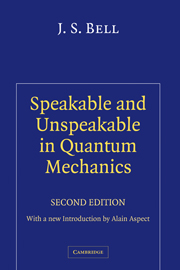Book contents
- Frontmatter
- Contents
- List of papers on quantum philosophy by J. S. Bell
- Preface to the first edition
- Acknowledgements
- Introduction: John Bell and the second quantum revolution
- 1 On the problem of hidden variables in quantum mechanics
- 2 On the Einstein–Podolsky–Rosen paradox
- 3 The moral aspect of quantum mechanics
- 4 Introduction to the hidden-variable question
- 5 Subject and object
- 6 On wave packet reduction in the Coleman–Hepp model
- 7 The theory of local beables
- 8 Locality in quantum mechanics: reply to critics
- 9 How to teach special relativity
- 10 Einstein–Podolsky–Rosen experiments
- 11 The measurement theory of Everett and de Broglie's pilot wave
- 12 Free variables and local causality
- 13 Atomic-cascade photons and quantum-mechanical nonlocality
- 14 de Broglie–Bohm, delayed-choice double-slit experiment, and density matrix
- 15 Quantum mechanics for cosmologists
- 16 Bertlmann's socks and the nature of reality
- 17 On the impossible pilot wave
- 18 Speakable and unspeakable in quantum mechanics
- 19 Beables for quantum field theory
- 20 Six possible worlds of quantum mechanics
- 21 EPR correlations and EPW distributions
- 22 Are there quantum jumps?
- 23 Against ‘measurement’
- 24 La nouvelle cuisine
15 - Quantum mechanics for cosmologists
Published online by Cambridge University Press: 11 April 2011
- Frontmatter
- Contents
- List of papers on quantum philosophy by J. S. Bell
- Preface to the first edition
- Acknowledgements
- Introduction: John Bell and the second quantum revolution
- 1 On the problem of hidden variables in quantum mechanics
- 2 On the Einstein–Podolsky–Rosen paradox
- 3 The moral aspect of quantum mechanics
- 4 Introduction to the hidden-variable question
- 5 Subject and object
- 6 On wave packet reduction in the Coleman–Hepp model
- 7 The theory of local beables
- 8 Locality in quantum mechanics: reply to critics
- 9 How to teach special relativity
- 10 Einstein–Podolsky–Rosen experiments
- 11 The measurement theory of Everett and de Broglie's pilot wave
- 12 Free variables and local causality
- 13 Atomic-cascade photons and quantum-mechanical nonlocality
- 14 de Broglie–Bohm, delayed-choice double-slit experiment, and density matrix
- 15 Quantum mechanics for cosmologists
- 16 Bertlmann's socks and the nature of reality
- 17 On the impossible pilot wave
- 18 Speakable and unspeakable in quantum mechanics
- 19 Beables for quantum field theory
- 20 Six possible worlds of quantum mechanics
- 21 EPR correlations and EPW distributions
- 22 Are there quantum jumps?
- 23 Against ‘measurement’
- 24 La nouvelle cuisine
Summary
Introduction
Cosmologists, even more than laboratory physicists, must find the usual interpretive rules of quantum mechanics a bit frustrating:
‘… any result of a measurement of a real dynamical variable is one of its eigenvalues …’
‘… if the measurement of the observable … is made a large number of times the average of all the results obtained will be …’
‘… a measurement always causes the system to jump into an eigenstate of the dynamical variable that is being measured …’
It would seem that the theory is exclusively concerned with ‘results of measurement’ and has nothing to say about anything else. When the ‘system’ in question is the whole world where is the ‘measurer’ to be found? Inside, rather than outside, presumably. What exactly qualifies some subsystems to play this role? Was the world wave function waiting to jump for thousands of millions of years until a single-celled living creature appeared? Or did it have to wait a little longer for some more highly qualified measurer – with a Ph.D.? If the theory is to apply to anything but idealized laboratory operations, are we not obliged to admit that more or less ‘measurement-like’ processes are going on more or less all the time more or less everywhere? Is there ever then a moment when there is no jumping and the Schrödinger equation applies?
- Type
- Chapter
- Information
- Speakable and Unspeakable in Quantum MechanicsCollected Papers on Quantum Philosophy, pp. 117 - 138Publisher: Cambridge University PressPrint publication year: 2004
- 3
- Cited by



